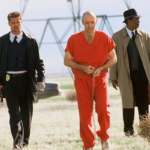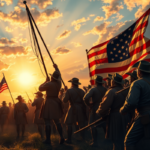When we think of conspiracy theories, we often think of modern phenomena fueled by the internet and social media. However, America’s love affair with conspiracy theories goes back much further than you might imagine. In fact, some of the wildest theories date back to the country’s founding. Here are ten of the most outlandish conspiracy theories from early American history:
1. The Illuminati Were Controlling the U.S. Government
The fear of secret societies runs deep in American history, and in the late 18th century, many Americans were convinced that the Bavarian Illuminati, a European secret society, was attempting to take control of the U.S. government. The Illuminati was founded in 1776, and by the 1790s, preachers, politicians, and pamphleteers were warning that this shadowy group had infiltrated American institutions. The hysteria was so widespread that President George Washington felt compelled to write a letter denying the Illuminati’s influence in America.
2. The British Crown Never Gave Up on Reclaiming America
Even after the American Revolution, some early Americans were convinced that the British Crown was secretly plotting to reclaim its former colonies. This theory gained traction whenever the U.S. faced internal strife or political unrest. Every time a new crisis emerged, rumors spread that the British were behind it, conspiring to weaken the fledgling nation so they could take it back by force.
3. Thomas Jefferson’s Secret Bible
Thomas Jefferson, one of the Founding Fathers, was known for his unorthodox religious views. However, some early Americans took these views to an extreme by spreading the rumor that Jefferson had a secret Bible where he removed all mentions of Jesus’ divinity and miracles. This “Jefferson Bible” was said to be part of a larger conspiracy to create a new, secular religion for America. While Jefferson did create his own version of the Bible, omitting supernatural elements, the idea that it was part of a secret plot was pure speculation.
4. The Newburgh Conspiracy
During the Revolutionary War, there was genuine fear of a military coup among the officers of the Continental Army, frustrated by Congress’s inability to pay them. This culminated in the so-called Newburgh Conspiracy of 1783. Though the plot was real, involving talks of marching on Congress, conspiracy theories quickly escalated the event into a tale of shadowy puppet masters behind the scenes, pulling strings to create a military dictatorship. General George Washington defused the situation with a heartfelt speech, but rumors of a grander conspiracy persisted.
5. The Founding Fathers Were Aliens
This theory may sound absurd, but some early Americans believed that the Founding Fathers were not entirely of this world. According to the lore, the wisdom and foresight of figures like Washington, Franklin, and Jefferson could only be explained by their extraterrestrial origins. These beliefs were often tied to mystical or religious views that saw the birth of the United States as part of a divine or cosmic plan.
6. Aaron Burr’s Western Empire
Aaron Burr, the third Vice President of the United States, was at the center of a conspiracy theory that alleged he was plotting to create an independent empire in the American West. After killing Alexander Hamilton in a duel, Burr’s political career was in tatters, but he still had powerful connections. The conspiracy claimed that Burr, with the help of foreign powers like Spain, planned to lead a secessionist movement in the western territories and install himself as the ruler. Burr was arrested and tried for treason, but was ultimately acquitted, leaving the true nature of his ambitions a mystery.
7. The French Connection
In the early years of the republic, fear of foreign influence was rampant, and many Americans believed that the French government was secretly trying to destabilize the United States. The XYZ Affair, a diplomatic incident in 1797-98, only fueled these fears, leading to widespread rumors that French agents were lurking everywhere, spreading revolutionary ideas and plotting to overthrow the government.
8. The Hessian Gold Hoax
During the Revolutionary War, a story spread that British Hessian mercenaries had buried vast amounts of gold somewhere in the American countryside. The theory was that the British had paid the Hessians in gold, but when the war was lost, the mercenaries buried their treasure to retrieve it later. Treasure hunters and conspiracy theorists have searched for this supposed gold for centuries, but no evidence has ever been found.
9. The Spanish Conspiracy
In the 1780s, as the United States struggled to define its borders, a conspiracy theory emerged that Spain was secretly plotting to detach the Western territories from the new nation. This “Spanish Conspiracy” suggested that Spain was bribing American settlers and politicians to join their empire. The theory gained so much traction that Congress had to investigate, but they found no substantial evidence to support the claims.
10. The Curse of Tippecanoe
Though not a conspiracy theory in the traditional sense, the so-called “Curse of Tippecanoe” is worth mentioning. According to the legend, after the Battle of Tippecanoe in 1811, in which future President William Henry Harrison defeated the Shawnee leader Tecumseh, a curse was placed on Harrison and future presidents. The curse supposedly doomed every president elected in a year ending in zero to die in office. Astonishingly, from Harrison in 1840 to Kennedy in 1960, every president elected in such a year did indeed die while serving. This eerie pattern led many to believe in the existence of a deadly curse or a sinister plot behind these deaths.



GIPHY App Key not set. Please check settings